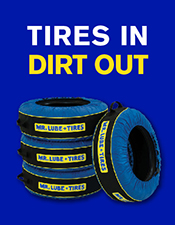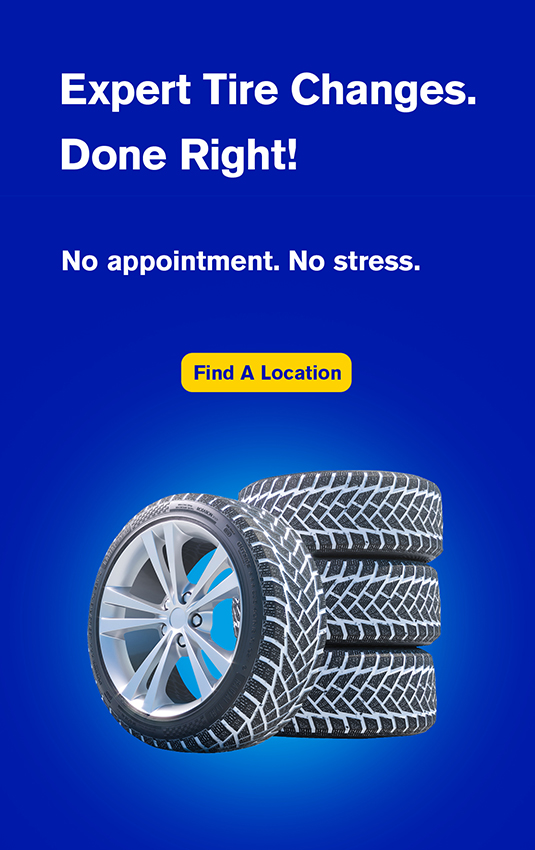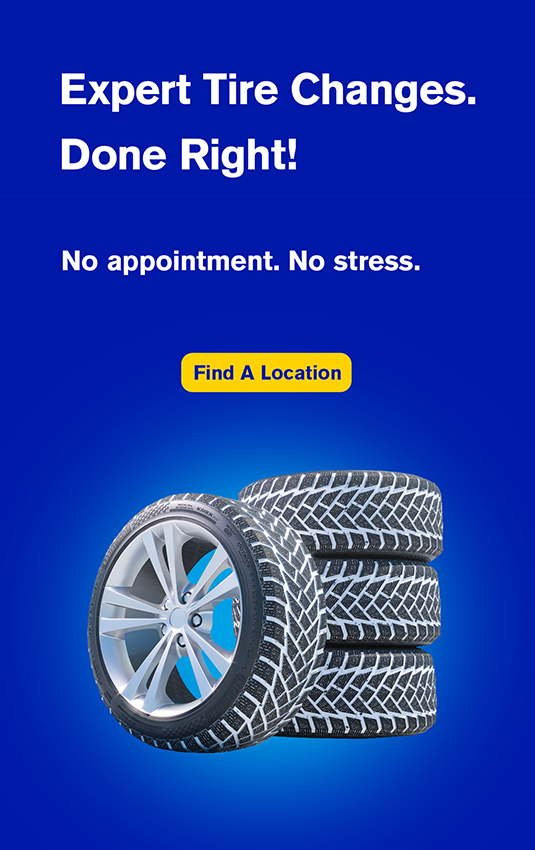Frequently Asked Questions
Oil Changes
Many vehicle manufacturers recommend a lighter weight oil be used in newer cars because newer engines are built to tighter tolerances than before. This requires a lighter weight oil for proper lubrication when the engine is cold. Lighter weight oil also helps to improve fuel economy.
Most manufacturers will list a range of oils that can be used for different conditions, such as temperatures below 30°C, temperatures above 40°C, or while towing. These weight ranges will be listed in your owner's manual.
Synthetic oil helps promote longer life and better performance in most vehicles. It bonds to engine parts providing a layer of protection that surpasses the protection afforded by conventional oil. Synthetic oil will also continue to pump through your engine when conventional oil would start to thicken in cold temperatures or break down from heat.
Synthetic oil is recommended particularly for vehicles that are driven in cold climates – it will help you start your engine even when the temperature drops to -40°C. It is also good for high stress situations, such as pulling and towing. Remember, you can always switch back to conventional oil after using synthetic oil.
Synthetic oils are man-made in a chemical plant and cost more to produce. They provide better protection at extreme temperatures than regular or conventional motor oils. Conventional oils are mineral-based and come from crude oil that is removed from the ground and run through a refinery.
While synthetics can improve engine performance, they don't eliminate the need for regular oil changes. Synthetics can handle the heat longer than regular oil but additives only work for so long and the engine will still contaminate the oil.
Mr. Lube + Tires recycles all used oil. It is treated and reused as burner and bunker fuels for industrial applications such as in mills, asphalt paving, cement plants and cruise ships. A percentage of the used oil also goes into re-refined oil.
Filters
The fuel filter is very important, especially on a car with fuel injection. A fuel filter removes the dirt from the fuel that can get into the fuel injection or carburetor and cause driving problems. Replacing the fuel filter once a year is preventive maintenance. Check your owner’s manual for your vehicle’s specific requirements.
During the hot summer months, contaminants such as pollen, dust, mold spores and smog can easily enter a vehicle's passenger compartment through the air conditioning, heating, and ventilation systems. This can make the air in the car up to six times dirtier than the air outside.
Cabin air filters clean the incoming air and remove allergens. You can protect yourself and your passengers from contaminants by replacing the vehicle's cabin air filter annually or whenever heating or cooling efficiency is reduced. In areas with heavy contaminants, it may require changing more often. If your vehicle’s model is from 2000 or newer, there's a good chance it is equipped with a cabin air filter. Check your owner's manual for more information.
General Vehicle Care and Maintenance
There are several ways to do this:
- Contact Transport Canada: http://www.tc.gc.ca/roadsafety/Recalls/search_e.asp
- Contact the dealer or manufacturer of your car
- To determine if your vehicle was involved in a recall and has not been corrected, you should contact the manufacturer and provide the vehicle's make, model, year, and vehicle ID number (VIN)
When the Check Engine light comes on, your car’s computer system is telling you that it has detected a problem by recognizing a fault in one of its sensors. You should have the car checked at the earliest possible opportunity.
A major cause of vehicle rust is the salt that is used on winter roads. To minimize rusting, have your vehicle undercoated at Mr. Lube + Tires or be sure to wash your vehicle whenever the temperature is warm enough, or at the very least when the spring thaw starts. Washing should include an undercarriage rinse (available at most car washes) to remove salt from hard-to-reach areas that are likely to rust, such as inside the wheel wells. If you’re washing your vehicle at home, be sure to spray the hose under the car and around the wheel wells.
It could be that your fuel system isn't as clean as it should be. The Mr. Lube + Tires Fuel System Cleaning Service cleans and conditions your fuel injectors, intake valves, combustion chambers and exhaust emissions by removing harmful deposits and moisture. This can help reduce hesitation and sluggishness, as well as improve fuel economy.
Tires that are under or over inflated can cause uneven tread wear, reduce the life of the tire, reduce traction and impact gas mileage, reducing your fuel economy. That’s why you should check your tire pressure at least once a month and adjust to the recommended pressure listed in your owner's manual. You can also find this information on a sticker in the trunk, on the door pillar, in the glove box or on your fuel door.
Radiator coolant, or anti-freeze as it is commonly known, works to combat both heat and cold. This helps to ensure your engine doesn't freeze or over-heat. Over time and with exposure to winter cold and summer heat, the protective components of this fluid are weakened, and its effectiveness can be dramatically decreased. Check and service your car's cooling system at the intervals recommended in your owner’s manual. The Mr. Lube + Tires Radiator Fluid Change Service will thoroughly flush your radiator and engine block, draining exhausted anti-freeze and replacing it with fresh, coolant that meets the specifications found in your owner’s manual.
Your air conditioner will not operate as efficiently when air and moisture make their way into the system. An annual inspection of the air conditioning system will ensure peak performance and may help prevent costly repairs.
Automotive experts, such as CAA, say that only a small percentage of vehicles sold in Canada require premium gasoline. For most vehicles premium gas will make little or no difference in terms of how well they perform. Follow the recommended octane requirement from the manufacturer and your vehicle will run properly.
Driving
Most vehicle manufacturers recommend that you service your vehicle more frequently if you drive in ‘severe’ conditions. A lot of drivers are surprised at what counts as severe driving. In fact, for most drivers ‘normal’ driving habits are actually ‘severe’. In Canada, because of the extreme heat and cold, all vehicles operate in severe driving conditions. Severe driving conditions include one or more of the following:
- Driving in stop and go traffic
- Driving in extremely hot or cold temperatures
- Driving for prolonged periods at higher engine speeds
- Taking multiple trips averaging 8-12 km in distance
- Frequent cold start-ups and shut-downs
- Extensive engine idling
- Towing and/or hauling heavy loads
- Driving in dusty or muddy conditions
- Driving in mountainous terrain
Protect your car with frequent services and proper maintenance to counteract the effects of severe driving conditions. Check your owner’s manual for service recommendations and talk to an expert.
Driving short distances often makes an engine dirtier than driving long distances at high speeds. Engines create carbon from the combustion of air and gasoline. Some of this carbon is emitted through the exhaust but some of it also remains in the engine. This remaining carbon is cleaned and circulated in the engine oil.
As the engine heats up more of this carbon is burned up and blown out through the exhaust. If you only drive short distances the engine may never get hot enough to exhaust the carbon so it will remain in the engine. This is why it’s a good idea to drive your vehicle on the highway for 20 minutes to help clean the engine.
Brakes
No, there’s nothing wrong with your brakes, this is what an anti-lock braking system (ABS) does. When you brake hard in a car without ABS, you will often lock up one or more wheels depending on the speed, road conditions, etc. This wheel lock-up results over longer stopping distances. On a car without ABS you should manually pump the brakes to prevent wheel lockup.
On a car with ABS, the computer keeps your brakes from locking up. Your foot should remain firmly on the brake pedal, which allows the system to automatically pump the brakes. This on and off pressure to the wheels is felt in the brake pedal as a vibration or pulsation.
Depending on driving habits, most cars need a brake service between every 40,000-50,000 km. However, this is merely a guide. Both parts and labour costs can rise dramatically if, for instance, the braking system needs an overhaul. It’s always good practice to consult your owner’s manual, but disc pads need to be checked regularly.
Other Services
When rounding corners, a vehicle's outer wheels travel further than the inner ones. The differential gear set prevents skidding by letting the wheels rotate at different speeds. This results in safe, smooth turns. The Mr. Lube + Tires Differential Fluid Change Service replaces old gear oil containing harmful metal fragments with new lubricant to reduce wear and prolong the life of the gears and bearings within the differential. Check your owner's manual for the required service interval for your vehicle.
It takes a complex set of pumps, valves, pistons and clutches to make your car shift gears so automatic transmission fluid is important to make sure everything runs smoothly. Not only is keeping your fluid in check good practice, manufacturers also know you'd rather replace fluid than the transmission. A Mr. Lube + Tires Automatic Transmission Service replaces 100% of the old fluid with clean new fluid to improve performance, prevent repair bills, and extend the life of your transmission. Check your owner's manual for the required service interval for your vehicle.







